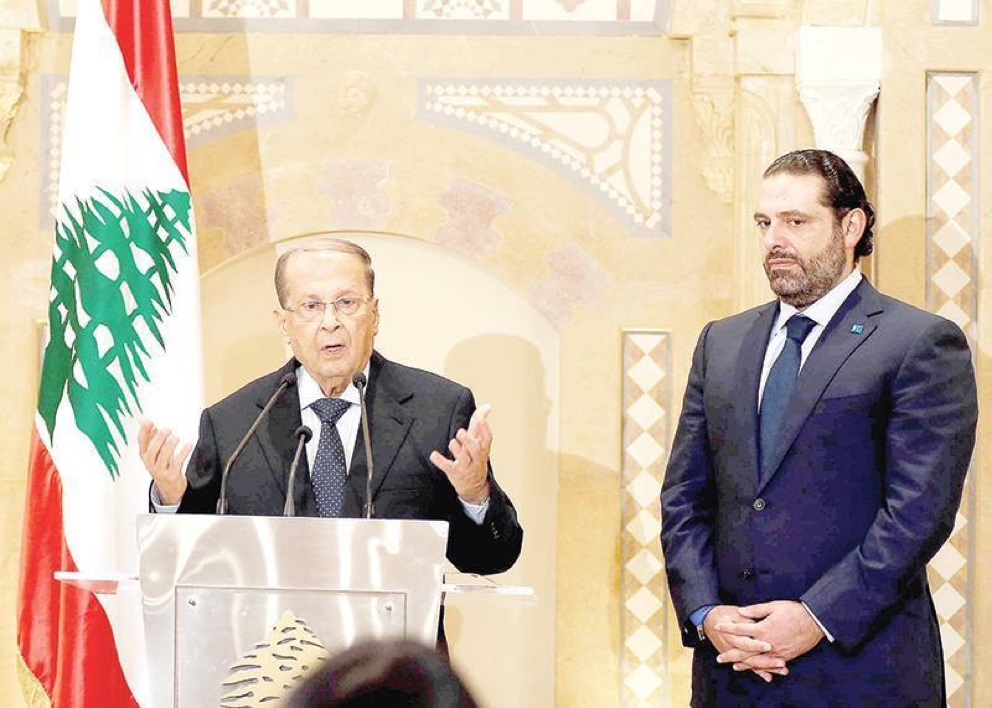AhlulBayt News Agency (ABNA): After nearly a year of turmoil in the Lebanese political scene, Saad Hariri was tasked with forming a cabinet in October last year for the fourth time in his political life. He was supposed to designate his new government members in less than 10 days, and even in December he announced that he had introduced a technocratic cabinet to President Michel Aoun. But despite all these actions, the country still is suffering from power vacuum. Upon his designation, Hariri promised to revive the French roadmap and set aside the old political rifts.
In the recent weeks, Hariri and his orbit pointed the fingers of blame at Aoun as the factor behind the failure to form a new government. Over the past month, the differences between the two political figures dramatically intensified, making the tensions between them a brazen matter for the nation’s media and public. The conflict of views over a new cabinet elevated to new heights since December last year and reached their peak last week. At a meeting with caretaker Prime Minister Hasan Diab, Aoun accused Hariri of “lying”, a leaked video showed, triggering severe attacks on the president from Hariri team.
Hariri-Aoun dispute escalates
As of mid-December 2020, differences between the two had escalated following Hariri's presentation of a list of ministers to Aoun. On the one hand, Hariri claims he intends to form a technocratic government free of sectarian polarizations, and on the other, Aoun argues that he does not allow illegal moves by the PM-designate in protection of the Lebanese constitution.
In the past few days, Hariri in a statement attacking the president, claimed the “country is in an abyss of suffering but the powerful president is indifferent”. Referring to the president’s recent remarks in Al-Akhbar newspaper, he denounced Aoun’s comments and rejected attempt to turn the political dispute into an Islamic-Christian one and impose his favorable individuals.
“Transfer of the political dispute to the sectarian arena is an unsuccessful and rejected attempt that will not pass, to organize an Islamic-Christian clash that some consider as the shortest muddy way to refloat those they want to refloat and pave the Baabda road for the political legacy,” he said on Friday.
Hariri added that they want a technocratic government, while the “presidency wants a partisan one.” Also Hariri’s close circles claim that Aoun is trying to secure a one-third of the disputed seats in the new cabinet, which is a source of the failure to form a new cabinet.
Commenting on the new government and the reason behind cutting off toes with Hariri, Aoun said: “There is no need for me to invite him to come to Ba'bada [palace]. I told him earlier that if he came to Ba'bada with a balanced government, we would welcome him. But on December 23, he introduced a government of 18 ministers, which was unbalanced, and I opposed it, and now, if our request is met, Ba'bada doors are open to him.”
“These allegations are not true at all, and the statements issued by the Ba’bada palace confirm this," said the president’s press office in a statement in response to reports that Aoun had requested one-third of the disputed seats in the new cabinet.
Lebanese political community’s key question: Who is really to blame for the delay?
Amid the exchange of the accusations and attacks, the question is that who is really behind the delay to form the government?
In all the days following Saad Hariri's tasking with a new cabinet, the media supporting him in the Arab and Western world pointed the finger of blame at Hezbollah, but in recent weeks Hariri's circle, even more so than Hezbollah, have accused President Aoun of obstructing the formation of a new government.
Certainly, Saad Hariri is presently trying to impose three demands on them and other Lebanese political groups by accusing Hezbollah and Aoun of being the cause of the ongoing political limbo.
First, Hariri seeks to, under the ruse of technocratic government, appoint as new ministers his friends and puppets who are mainly vassals of Saudi Arabia and Western governments.
Second, by raising the technocratic government, Hariri tries to promote himself as an advocate of the political reforms. This, he thinks, can allow him ride the negative views of the public to the quota system and thus paint Hezbollah and other rival forces as responsible for the current crisis.
And third, by unraveling the political arrangement that was agreed upon after 15 years of civil war under Taif Agreement in 1989, Hariri wants to realize the demands of his foreign supporters for marginalization and isolation of Hezbollah from power.
But unquestionably the main root of absence of a government in the country can be blamed on two important factors: The first one is the heterogeneity of the electoral system and the totalitarianism in the politics. Lebanon is made up of a mosaic of identities and the current political and electoral system is based on a common consensus based on which all these identities have to participate in the political process. Naturally in such context, political monopolism based on populist slogans like the quota-free government not only does not help solve problems but also compounds the issues and exacerbates the crises.
Another significant variable hampering the new government formation efforts is the meddling of such countries as France, Saudi Arabia, and the US in Lebanon’s home affairs and supporting specific figures in the Lebanese politics. This stands as a cause to the political scene turning into a field of geopolitical rivalry of foreign actors with highly conflicting interests. The foreign impacts are so deep that even if the home actors are willing to settle their differences, foreign pressures often disrupt the process.
/129

